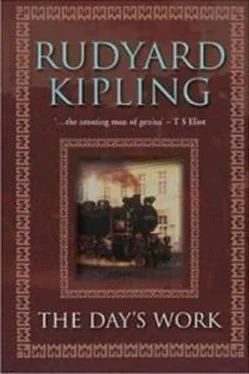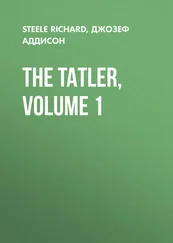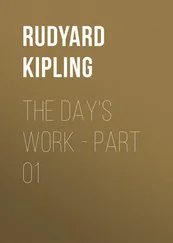Джозеф Киплинг - The Day's Work - Volume 1
Здесь есть возможность читать онлайн «Джозеф Киплинг - The Day's Work - Volume 1» весь текст электронной книги совершенно бесплатно (целиком полную версию без сокращений). В некоторых случаях можно слушать аудио, скачать через торрент в формате fb2 и присутствует краткое содержание. Год выпуска: 2014, Издательство: epubBooks Classics, Жанр: Прочие приключения, на английском языке. Описание произведения, (предисловие) а так же отзывы посетителей доступны на портале библиотеки ЛибКат.
- Название:The Day's Work - Volume 1
- Автор:
- Издательство:epubBooks Classics
- Жанр:
- Год:2014
- ISBN:нет данных
- Рейтинг книги:3 / 5. Голосов: 1
-
Избранное:Добавить в избранное
- Отзывы:
-
Ваша оценка:
- 60
- 1
- 2
- 3
- 4
- 5
The Day's Work - Volume 1: краткое содержание, описание и аннотация
Предлагаем к чтению аннотацию, описание, краткое содержание или предисловие (зависит от того, что написал сам автор книги «The Day's Work - Volume 1»). Если вы не нашли необходимую информацию о книге — напишите в комментариях, мы постараемся отыскать её.
The Day's Work - Volume 1 — читать онлайн бесплатно полную книгу (весь текст) целиком
Ниже представлен текст книги, разбитый по страницам. Система сохранения места последней прочитанной страницы, позволяет с удобством читать онлайн бесплатно книгу «The Day's Work - Volume 1», без необходимости каждый раз заново искать на чём Вы остановились. Поставьте закладку, и сможете в любой момент перейти на страницу, на которой закончили чтение.
Интервал:
Закладка:
"Peace, thou!" lowed the Bull. "The worship of the schools is mine, and they talk very wisely, asking whether I be one or many, as is the delight of my people, and ye know what I am. Kali, my wife, thou knowest also."
"Yea, I know," said the Tigress, with lowered head.
"Greater am I than Gunga also. For ye know who moved the minds of men that they should count Gunga holy among the rivers. Who die in that water—ye know how men say—come to us without punishment, and Gunga knows that the fire–carriage has borne to her scores upon scores of such anxious ones; and Kali knows that she has held her chiefest festivals among the pilgrimages that are fed by the fire–carriage. Who smote at Pooree, under the Image there, her thousands in a day and a night, and bound the sickness to the wheels of the fire–carriages, so that it ran from one end of the land to the other? Who but Kali? Before the fire–carriage came it was a heavy toil. The fire–carriages have served thee well, Mother of Death. But I speak for mine own altars, who am not Bhairon of the Common Folk, but Shiv. Men go to and fro, making words and telling talk of strange Gods, and I listen. Faith follows faith among my people in the schools, and I have no anger; for when all words are said, and the new talk is ended, to Shiv men return at the last."
"True. It is true," murmured Hanuman. "To Shiv and to the others, mother, they return. I creep from temple to temple in the North, where they worship one God and His Prophet; and presently my image is alone within their shrines."
"Small thanks," said the Buck, turning his head slowly. "I am that One and His Prophet also."
"Even so, father," said Hanuman. "And to the South I go who am the oldest of the Gods as men know the Gods, and presently I touch the shrines of the New 'Faith and the Woman whom we know is hewn twelve–armed, and still they call her Mary."
"Small thanks, brother," said the Tigress. "I am that Woman."
"Even so, sister; and I go West among the fire–carriages, and stand before the bridge–builders in many shapes, and because of me they change their faiths and are very wise. Ho! ho! I am the builder of bridges, indeed—bridges between this and that, and each bridge leads surely to Us in the end. Be content, Gunga.
"Neither these men nor those that follow them mock thee at all."
"Am I alone, then, Heavenly Ones? Shall I smooth out my flood lest unhappily I bear away their walls? Will Indra dry my springs in the hills and make me crawl humbly between their wharfs? Shall I bury me in the sand ere I offend?"
"And all for the sake of a little iron bar with the fire–carriage atop. Truly, Mother Gunga is always young!" said Ganesh the Elephant. "A child had not spoken more foolishly. Let the dirt dig in the dirt ere it return to the dirt. I know only that my people grow rich and praise me. Shiv has said that the men of the schools do not forget; Bhairon is content for his crowd of the Common People; and Hanuman laughs."
"Surely I laugh," said the Ape. "My altars are few beside those of Ganesh or Bhairon, but the fire–carriages bring me new worshippers from beyond the Black Water—the men who believe that their God is toil. I run before them beckoning, and they follow Hanuman."
"Give them the toil that they desire, then," said the River. "Make a bar across my flood and throw the water back upon the bridge. Once thou wast strong in Lanka, Hanuman. Stoop and lift my bed."
"Who gives life can take life." The Ape scratched in the mud with a long forefinger. "And yet, who would profit by the killing? Very many would die."
There came up from the water a snatch of a love–song such as the boys sing when they watch their cattle in the noon heats of late spring. The Parrot screamed joyously, sidling along his branch with lowered head as the song grew louder, and in a patch of clear moonlight stood revealed the young herd, the darling of the Gopis, the idol of dreaming maids and of mothers ere their children are born—Krishna the Well–beloved. He stooped to knot up his long wet hair, and the parrot fluttered to his shoulder.
"Fleeting and singing, and singing and fleeting," hiccupped Bhairon. "Those make thee late for the council, brother."
"And then?" said Krishna, with a laugh, throwing back his head. "Ye can do little without me or Karma here." He fondled the Parrot's plumage and laughed again. "What is this sitting and talking together? I heard Mother Gunga roaring in the dark, and so came quickly from a but where I lay warm. And what have ye done to Karma, that he is so wet and silent? And what does Mother Gunga here? Are the heavens full that ye must come paddling in the mud beast–wise? Karma, what do they do?"
"Gunga has prayed for a vengeance on the bridgebuilders, and Kali is with her. Now she bids Hanuman whelm the bridge, that her honour may be made great," cried the Parrot. "I waited here, knowing that thou wouldst come, O my master!"
"And the Heavenly Ones said nothing? Did Gunga and the Mother of Sorrows out–talk them? Did none speak for my people?"
"Nay," said Ganesh, moving uneasily from foot to foot; "I said it was but dirt at play, and why should we stamp it flat?"
"I was content to let them toil—well content," said Hanuman.
"What had I to do with Gunga's anger?" said the Bull.
"I am Bhairon of the Common Folk, and this my staff is Kotwal of all Kashi. I spoke for the Common People."
"Thou?" The young God's eyes sparkled.
"Am I not the first of the Gods in their mouths today?" returned Bhairon, unabashed. "For the sake of the Common People I said very many wise things which I have now forgotten, but this my staff—"
Krishna turned impatiently, saw the Mugger at his feet, and kneeling, slipped an arm round the cold neck. "Mother," he said gently, "get thee to thy flood again. This matter is not for thee. What harm shall thy honour take of this live dirt? Thou hast given them their fields new year after year, and by thy flood they are made strong. They come all to thee at the last. What need to slay them now? Have pity, mother, for a little and it is only for a little."
"If it be only for a little—" the slow beast began.
"Are they Gods, then?" Krishna, returned with a laugh, his eyes looking into the dull eyes of the River. "Be certain that it is only for a little. The Heavenly Ones have heard thee, and presently justice will be done. Go now, mother, to the flood again. Men and cattle are thick on the waters—the banks fall—the villages melt because of thee."
"But the bridge–the bridge stands." The Mugger turned grunting into the undergrowth as Krishna rose.
"It is ended," said the Tigress, viciously. "There is no more justice from the Heavenly Ones. Ye have made shame and sport of Gunga, who asked no more than a few score lives."
"Of my people—who lie under the leaf–roofs of the village yonder—of the young girls, and the young men who sing to them in the dark of the child that will be born next morn—of that which was begotten tonight," said Krishna. "And when all is done, what profit? Tomorrow sees them at work. Ay, if ye swept the bridge out from end to end they would begin anew. Hear me! Bhairon is drunk always. Hanuman mocks his people with new riddles."
"Nay, but they are very old ones," the Ape said, laughing.
"Shiv hears the talk of the schools and the dreams of the holy men; Ganesh thinks only of his fat traders; but I—I live with these my people, asking for no gifts, and so receiving them hourly."
"And very tender art thou of thy people," said the Tigress.
"They are my own. The old women dream of me turning in their sleep; the maids look and listen for me when they go to fill their lotahs by the river. I walk by the young men waiting without the gates at dusk, and I call over my shoulder to the whitebeards. Ye know, Heavenly Ones, that I alone of us all walk upon the earth continually, and have no pleasure in our heavens so long as a green blade springs here, or there are two voices at twilight in the standing crops. Wise are ye, but ye live far off, forgetting whence ye came. So do I not forget. And the fire–carriage feeds your shrines, ye say? And the fire–carriages bring a thousand pilgrims where but ten came in the old years? True. That is true, today."
Читать дальшеИнтервал:
Закладка:
Похожие книги на «The Day's Work - Volume 1»
Представляем Вашему вниманию похожие книги на «The Day's Work - Volume 1» списком для выбора. Мы отобрали схожую по названию и смыслу литературу в надежде предоставить читателям больше вариантов отыскать новые, интересные, ещё непрочитанные произведения.
Обсуждение, отзывы о книге «The Day's Work - Volume 1» и просто собственные мнения читателей. Оставьте ваши комментарии, напишите, что Вы думаете о произведении, его смысле или главных героях. Укажите что конкретно понравилось, а что нет, и почему Вы так считаете.












